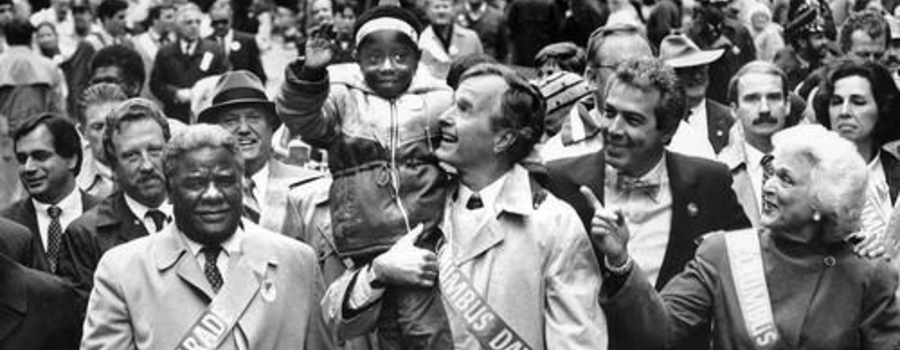
Photo: Vice President George H.W. Bush (center) and Rep. Marty Russo (to the right of Bush) at the Columbus Day Parade in Chicago in 1986.
Introduced by Rep. Martin Russo to the 102nd Congress (1991-1992) as H.R. 1300.
Index of Information on the Universal Health Care Act
- Details of the Universal Health Care Act
- Contemporary Analysis of the Universal Health Care Act
- Information on the Universal Health Care Act
Details of the Health Security Act
The Health Security Act would cover all U.S. citizens with comprehensive health benefits with no cost-sharing. Benefits include inpatient hospital services, nursing facility services, home health services, hospice care, medical care, prescription drugs and biologicals, preventive health services, home and community-based services, and any other medical or health services deemed appropriate.
The program would be administered by the Department of Health and Human Services (HHS) at the national level, but states have the option of administering the program at the state level under a state budget determined by HHS. Hospitals and institutions would be paid on prospective global budgets, and physicians would be paid on a fee-for-service basis. The bill ties the increase in the national healthcare budget to annual growth in the GDP (general inflation). Separate budgets are created for capital expenditures and medical education.
The program would be financed through:
- An increase in the top corporate income tax rate;
- A progressive increase in the household income tax;
- An increase in the taxable portion of social security income;
- Expansion of the existing employer hospital insurance tax; and
- A maintenance-of-effort requirement that states pay into the federal system in order for their residents to be eligible for benefits.
Contemporary Analysis of the Universal Health Care Act
In July 1993 the Congressional Budget Office released a report on "Estimates of Health Care Proposals from the 102nd Congress," which includes an analysis of the impact of the Universal Health Care Act of 1991, H.R. 1300, along with four other health reform bills.
The CBO estimated that enactment of H.R. 1300 would raise national health expenditures slightly at first but would reduce spending about 9 percent by 2000. The administrative savings from switching to a single-payer system would offset most of the cost of the additional services demanded by consumers who would no longer face any out-of-pocket charges. Over the longer run, the cap on the growth of the national health budget – assumed to be 75 percent effective – would hold the rate of growth of spending on covered services below the baseline.
Information on the Universal Health Care Act
Read the full bill from 102nd Congress (1991-1992).
Read the summary of H.R. 1300 from the 102nd Congress (1991-1992).
See the list of 72 Congressional cosponsors for the 102nd Congress (1991-1992).
